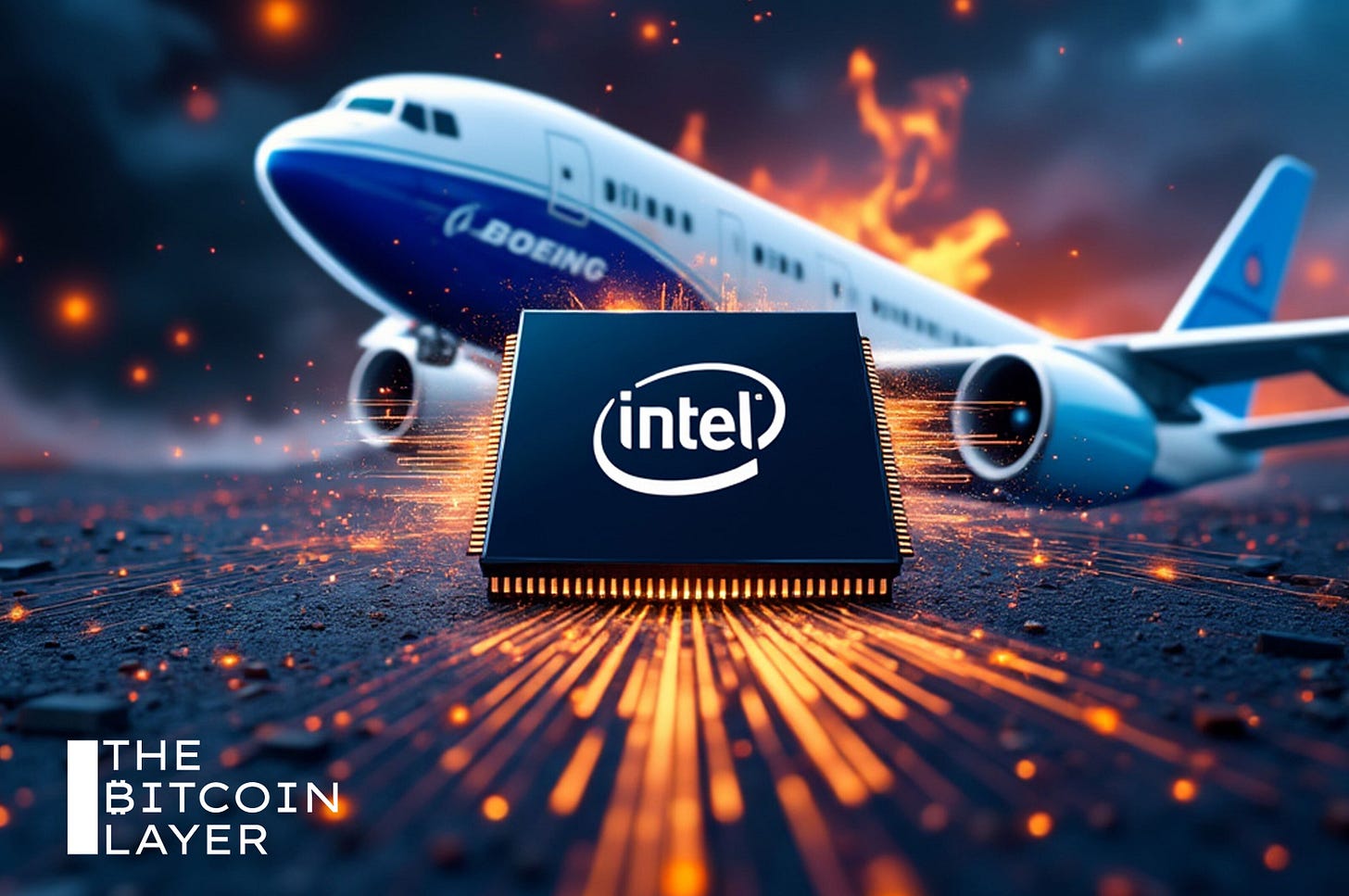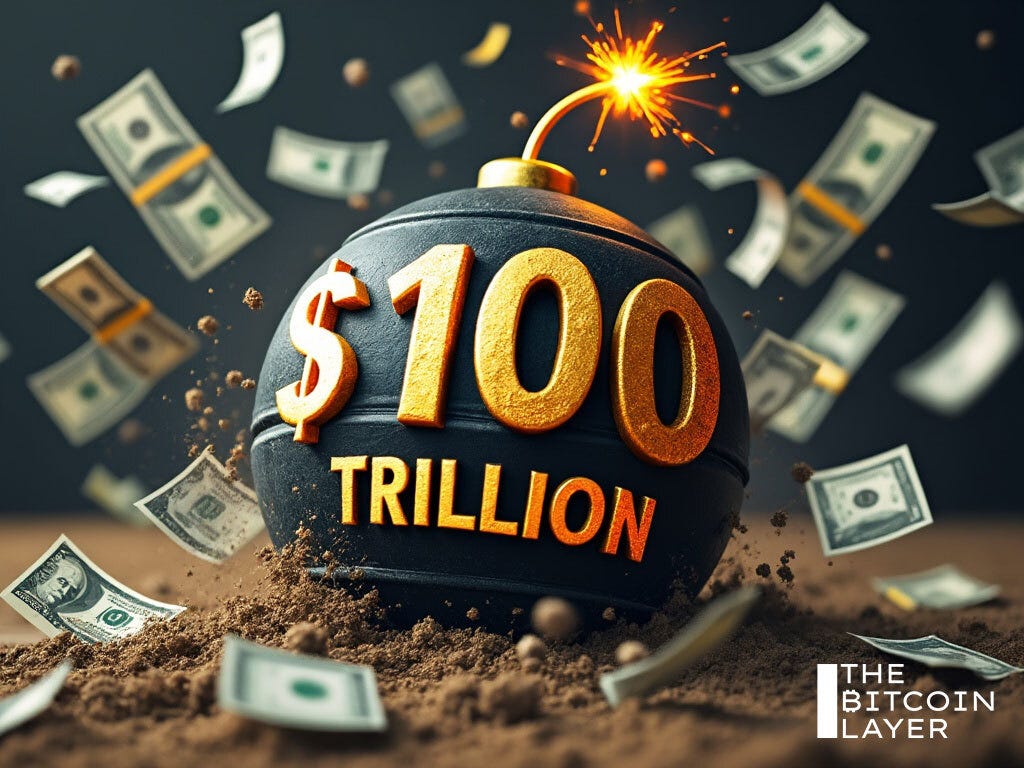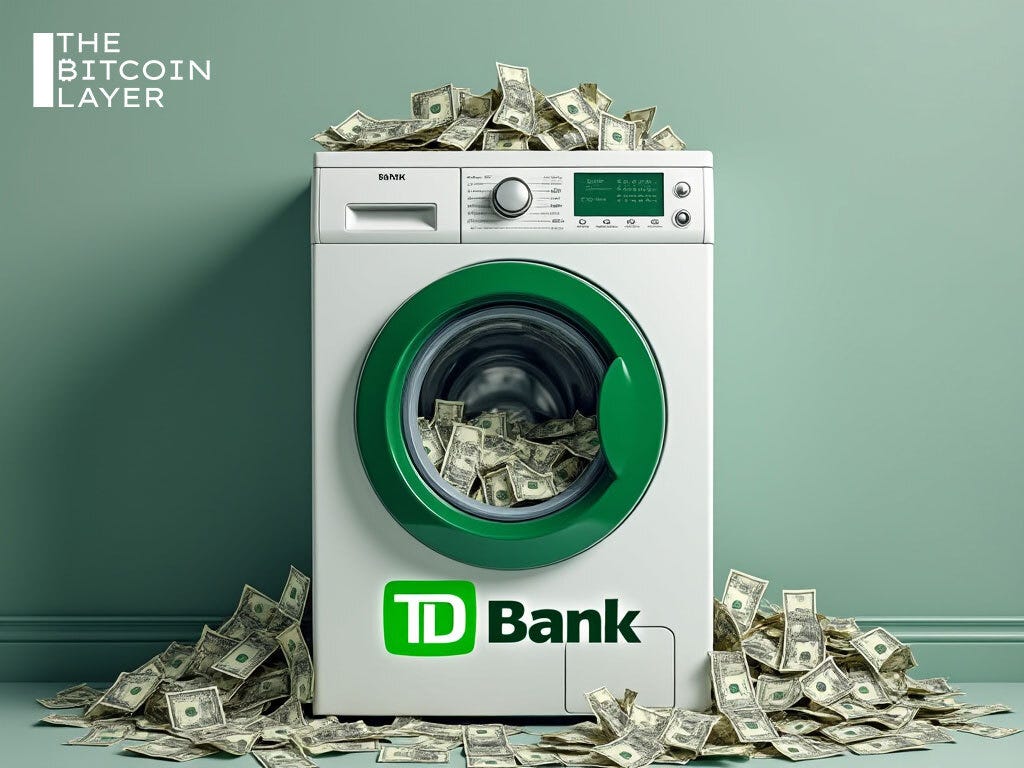TBL Thinks: Boeing & Intel Crises, $100 Trillion Public Debt, and TD's Money Laundering Shenanigans
Dear Readers,
It’s Thinking Time! This week we cover the crises that Boeing and Intel face, and why it’s a big deal, the IMF’s warnings about hitting $100 trillion in public debt, and TD Bank’s decade-long money laundering activities finally catching up with them.
TBL Thinks is our way to summarize the most important paywalled, longer reads relevant to global macroeconomics, helping you cut through the noise. With that in mind, please enjoy.
Unchained empowers you to fully control your Bitcoin with a collaborative multisig vault, where you hold two of three keys and benefit from a dedicated Bitcoin security partner. Purchase bitcoin directly into your cold storage vault and eliminate exchange risks with Unchained's Trading Desk.
Unchained also offers the best IRA product in the industry, allowing you to easily roll over old 401(k)s or IRAs into Bitcoin while keeping control of your keys.
Don’t pay more taxes than you need to. Use code TBL for $100 off when you create an account.
Crises at Boeing and Intel
Crises at Boeing and Intel are a National Emergency (WSJ) Once the crown jewels of USA’s manufacturing industry, Boeing and Intel seem to have both lost their shine. Boeing has been beleaguered with investigations into crashes and a midair mishap, and more recently production delays and a strike. Industry insiders have begun to think the unthinkable: if a breakup or bankruptcy is in Boeing’s not-so-distant future. Intel, too, is in a perilous position as it slashes jobs and capital spending, and suspends dividends, now finding itself a takeover target.
Three years ago, Intel was worth double its current value. In fact, the two companies, Intel and Boeing, have seen their combined market value fall by half in the last five years. This is quite troublesome for a country that is in the midst of a geopolitical battle with China over economic, technological, and military prowess. Leaders from both political parties are pushing for tariffs and subsidies to help the two behemoths of their respective industries, but many question if that can help address the underlying problem: the country that designs some of the world’s most innovative products is losing the knack to make them.
Intel and Boeing, which were both known for manufacturing groundbreaking products, and their demand for consistent high quality fell prey to prioritizing finances over engineering—Intel passed on making the chips for Apple’s first iPhone, and Boeing decided it would be faster and cheaper to add more efficient engines to its 737 with the help of software rather than redesigning or replacing the plane. Intel missed the artificial intelligence move when it passed on Apple's, and Boeing’s decision to outsource its supply chain along with experienced mechanists leaving during the pandemic have all added to the problems the two companies are facing.
So why do Intel and Boeing’s problems (that are of their own making) matter to us? With China’s threat to subjugate Taiwan looming over our heads, the entire US tech sector has the potential to be at Beijing’s mercy. Apple, Nvidia, and Microsoft would all be rendered useless without advanced semiconductors whose fabrication they contract out to TSMC in Taiwan. Intel is the only US-based company capable of competing with TSMC, and even then, it could be years before the US is no longer reliant on Taiwan for chips. On the other hand, with Boeing, even though Musk’s SpaceX has outclassed Boeing in space transport (remember the astronauts that stayed stuck in space for months?), there is no homegrown alternative for large commercial airliners. In the absence of Boeing, business would go to Airbus or China’s state-owned Comac which is delivering competitors to Boeing and Airbus’ top sellers.
With Boeing being the US’ largest manufacturing exporter and a large R&D spender as an engineering-intensive company, and Intel being the country’s answer to build up its semiconductor industry, their failure would deal a heavy blow to the country—national security dictates the US maintain some know-how in making aircraft and semiconductors.
A larger question is whether either of these companies might have to be nationalized. This would be a stain on the US and its corporate history, much like the failure of General Motors in 2008.
❌ DON’T WRITE YOUR SEED ON PAPER 📝
It’s estimated that ~30% of Bitcoin is lost forever. Poor seed phrase security is a big reason why. This is why we use Stamp Seed, a DIY kit that enables you to hammer your seed words into a durable plate of titanium using professional stamping tools.
Heat-resistant to 3,000ºF, rust-proof, crush-proof, and time-proof
Compact and easy to hide
No loose parts, such as screws or letter tiles
Take 15% off with code TBL. Get your Stamp Seed today!
A Fiscal Disaster in the Making
World’s $100 Trillion Fiscal Timebomb Keeps Ticking (BBG) The IMF is sounding the alarm, and it wants global finance chiefs to listen. The International Monetary Fund gathered in Washington starting Monday of this week for its annual meetings, where it has issued an appeal to ministers and central bankers to get their fiscal houses in order, as public debt—driven by US and China—threatens to hit $100 trillion this year.
The IMF also issued a warning that wars, trade tensions, high debt and low growth all threaten to exacerbate an already lackluster economy, while adding that higher consumer prices globally, conflict in the Middle East and Europe, and medium-term growth prospects are all reasons to be cautious. All these, the IMF reasons, can leave countries without adequate resources to tackle issues like poverty and climate change.
The US and China also got a rap on their knuckles for their geopolitical rivalry, which led them to pursue domestically focused industrial and protectionist policies. The two countries were also called out for their elevated debt levels, uncertainty surrounding fiscal policy, both of which have the potential to generate significant spillovers in the form of higher borrowing costs and debt-related risks in other economies.
While the IMF is one of the institutions at the center of exacerbating global economic inequality, it is not responsible for public debt at the national level. It is identifying the horrific sovereign finances, and there isn’t a great solution proposed other than “please address it.” For bitcoin and financial assets, the stock of government debt hitting $100 trillion is certain to expand, meaning our TBL Liquidity metric which measures global banking balance sheets will increase accordingly. Governments print money when they borrow and spend—and much of it ends up directly impacting asset prices.
Banks Emerge Spotless Post Money Laundering
Bankers Dodging Blame for Money Laundering Never Ends (BBG) The Toronto-Dominion Bank (TD Bank) was hit with $3.1 billion in fines as it pled guilty as an institution to enabling money laundering, with much of it linked to the criminal trade in Fentanyl. Even as shareholders pay the price for the bank’s follies, executives and management emerged unscathed
and unbothered.Bloomberg forecasts that the fines will cut the bank’s expected net income in 2024 by one-third. Sanctions on the bank include an asset cap in the US which stops TD Bank from growing there, an attempt already once thwarted due to criminal and regulatory investigations in its deal with US bank First Horizon.
Apart from a slight pay docking, and a perfunctory mea culpa from the bank’s CEO, Bharat Masrani and TD’s Head of Banking US, Leo Salom, no civil or criminal action is planned for the leaders who set TD’s culture, incentives and practices.
TD Bank failed to comply with US’ main anti-money-laundering law, the Bank Secrecy Act, and despite senior management being aware of suspicious activities being carried out for over a decade, it did nothing. Internal messages sent between employees ranged from worry to jokes about the blatant money laundering that was going on in the bank. TD Bank became the largest bank in US history plead guilty to violating the Bank Secrecy Act, and the first bank in the US to plead guilty to conspiracy to commit money laundering according to Attorney General Merrick Garland. They say bitcoin is a criminal’s currency, but thankfully we know the truth.
Until next time,
TBL Thinks
Unchained empowers you to fully control your Bitcoin with a collaborative multisig vault, where you hold two of three keys and benefit from a dedicated Bitcoin security partner. Purchase bitcoin directly into your cold storage vault and eliminate exchange risks with Unchained's Trading Desk.
Unchained also offers the best IRA product in the industry, allowing you to easily roll over old 401(k)s or IRAs into Bitcoin while keeping control of your keys.
Don’t pay more taxes than you need to. Use code TBL for $100 off when you create an account.









